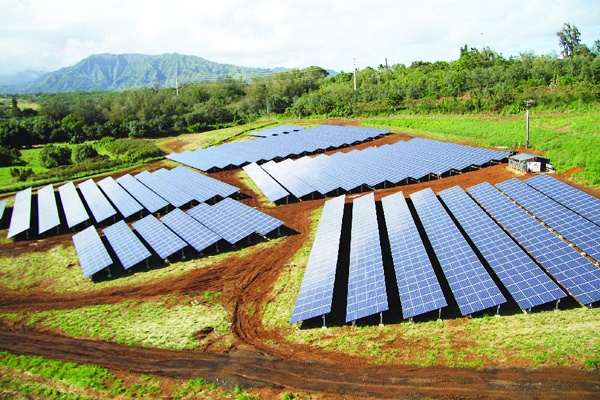LIHU‘E — Two bills that would enable the state Public Utility Commission to consider the Kaua‘i Island Utility Cooperative’s status as a member-owned, nonprofit co-op when reviewing regulatory issues have made considerable progress in both chambers of the state Legislature,
LIHU‘E — Two bills that would enable the state Public Utility Commission to consider the Kaua‘i Island Utility Cooperative’s status as a member-owned, nonprofit co-op when reviewing regulatory issues have made considerable progress in both chambers of the state Legislature, with ample support from some state agencies and every member of the Kaua‘i County Council.
Senate Bill 1045 and House Bill 815 authorize PUC to exempt an electric cooperative from compliance with Chapter 269 of the Hawai‘i Revised Statutes, and with any other applicable charters, franchises, rules, decisions, orders or laws.
Neither bill names KIUC, but Kaua‘i has the only electric co-op in the state. KIUC Communications Manager Jim Kelly said the bills were developed in consultation with PUC and the Division of Consumer Advocacy. PUC offered to submit them as part of its legislative package, he said.
“Chapter 269 was enacted long before any electric cooperatives existed in Hawai‘i, and so the basis of all regulation is made with the assumption that all utilities in the state are for-profit enterprises,” Kelly said. “We’re not.”
As the state’s only member-owned electric co-op, KIUC is asking PUC and DCA to have the option of evaluating KIUC on the basis of being a co-op, he said.
As an example, Kelly said that under state law, in a rate case the PUC and DCA are obligated to consider the rate of return for the utility’s shareholders.
“This concept does not apply to a cooperative, where the ratepayers and customers are one and the same,” he said. “But the existing law doesn’t give state regulatory authorities the ability to look at KIUC differently.”
Rep. Derek Kawakami, D-14th District, voted twice for HB 815, at the House Energy and Environmental Protection, and Consumer Protection and Commerce committees. He said the bill gives PUC a tool to differentiate investor-owned utilities from co-ops, which are nonprofit organizations.
“It does not deregulate or take away any oversight,” said Kawakami, adding that the CPC Committee, of which he is vice chair, added strength to the House bill.
“We added a preamble to further solidify that the intent of this measure is not to allow the cooperative from not complying with any of the state energy requirements.”
Kelly also said the proposals are not seeking deregulation or removal of oversight; they’re simply giving regulators the ability to consider KIUC differently from investor-owned utilities, a different business model.
“This would not exempt us from any statutory obligations for pursuing renewable energy and efficiency goals,” Kelly said. “We will continue our work as one of Hawai‘i’s green energy leaders and we’ll keep offering our members creative, low-cost options for lowering their utility bills through conservation.”
Kawakami said KIUC goals are “far more lofty” than the rest of the state, and as far as efficiency, modernization and pursuing renewable energy, the co-op is “above and beyond” electric companies in other counties.
Besides favorable testimony from each member of the Kaua‘i County Council, other supporting testimony include letters from DCA Executive Director Jeffrey Ono, PUC Chair Mina Morita and KIUC COO Michael Yamane.
Opposition
The Blue Planet Foundation, a nonprofit organization committed to end the use of fossil fuels on earth, and KIUC board candidate Jonathan Jay sent testimony in opposition to the bills.
Blue Planet states in its testimony that state utility policy benefits customers, regardless of the utility organization type.
KIUC is currently lagging in energy efficiency, after being exempted by PUC from the Public Benefit Fee Administrator, according to Blue Planet. On a per-customer basis in the last six years, electricity consumption on Kaua‘i has been declining slower than the rest of the state, and this wouldn’t be the case had PUC included KIUC in the PBFA, Blue Planet states.
Jay said in his testimony that, if in theory, co-ops have their members’ support and therefore should not be balanced by PUC in the same manner as for-profits, “then let’s allow those utility co-ops to actually show and demonstrate the support of the members before relieving them of existing PUC regulatory burden.”
Without accountability mechanisms, “all we have is the utility’s word it is acting in the public interest,” said Jay, adding he trusts KIUC, but it is prudent to have verification.
• Léo Azambuja, staff writer, can be reached at 245-0452 or lazambuja@ thegardenisland.com.
The previous headline on this article, “More power to KIUC: Legislature pulling the plug on co-op’s compliance with state laws,” does not reflect the content of the bills or the story. The previous lead of the story was also incorrect in its statement that the bills “would exempt Kaua‘i Island Utility Cooperative from complying with many laws.”


